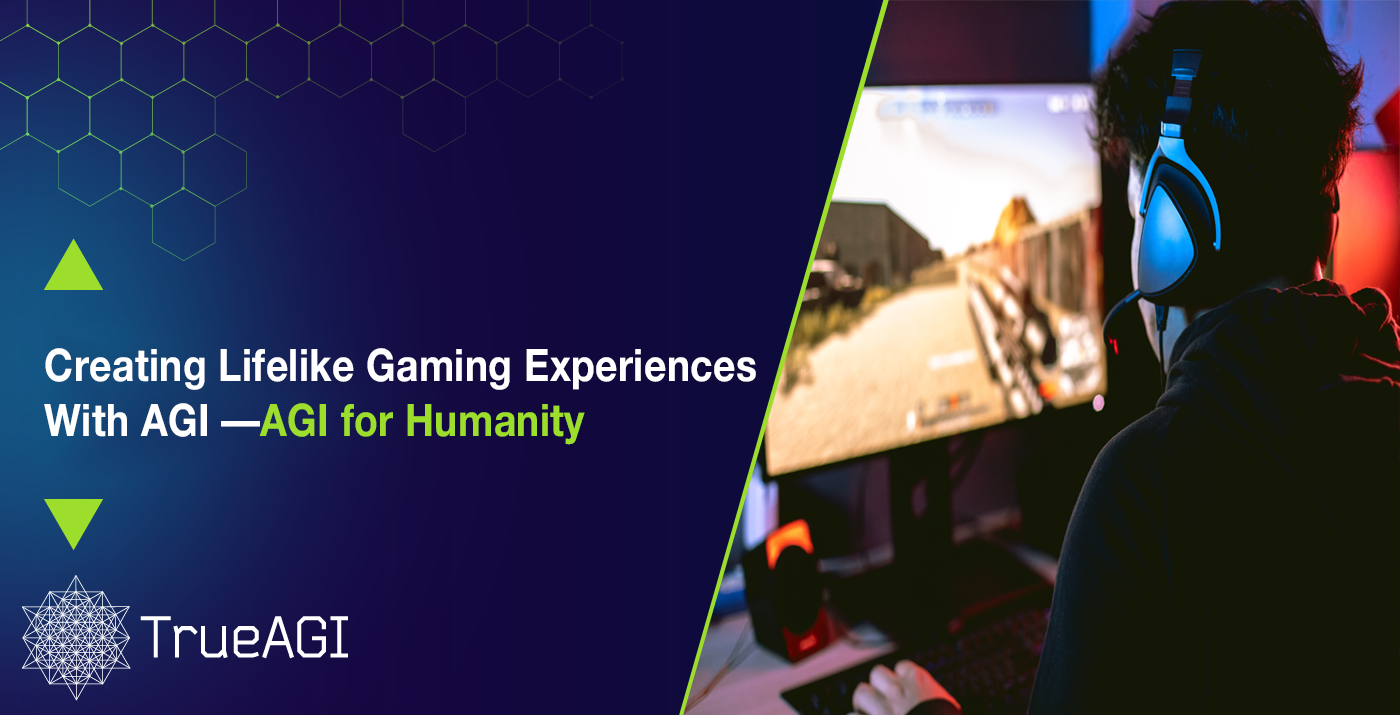Are You Ready to Discover More Engaging, Realistic, and Alive Gaming Universes?
There are approximately 3.1 billion active gamers worldwide—that’s roughly 38.5% of the world’s population.
Much like movies or music, video games have acquired a cultural status among many people. The gaming industry has risen through the ranks to the point of dominating the media landscape, second only to television in terms of revenue.
These remarkable statistics are merely one indicator that video games have evolved beyond a simple means of entertainment. Thanks to its consistent improvement and integration of the latest technologies through the ages, such as mobile devices or virtual reality, they have proven to be an effective device for multiple purposes, including storytelling, education, stimulating creative and strategic thinking, and fostering teamwork.
All this demonstrates the importance gaming has acquired in our societies both financially, culturally. As such, it provides multiple opportunities for mutual improvement.
But for that to happen, we need to take gaming to the next level. And the way to do that is by doing what gaming always has: leveraging technology to develop more interactive, engaging, and realistic gaming experiences.
Here’s where artificial intelligence comes in.
A Brief Overview of Video Games & AI
Artificial intelligence in gaming is nothing new. Even the legendary Pong (1972) used a basic AI engine to calculate the trajectory of a ball and move the paddle to hit it—and it wasn’t even the first!
The games you play today employ AI algorithms in various ways to enhance gameplay, create more realistic environments, and improve the overall gaming experience in multiple aspects, including:
- Non-player characters (NPCs): Game developers use AI algorithms to imbue NPCs with a range of capabilities, enabling them to navigate the game world independently and engage in realistic interactions with players. Moreover, NPCs can possess adaptive behaviors, reacting dynamically to changes in the game environment, enhancing immersion and making the game world feel alive.
- Enemy behavior: Similarly, developers can use different AI techniques—such as finite state machines, behavior trees, or reinforcement learning—to create enemies that exhibit strategic and responsive actions. AI-controlled enemies can adapt their tactics, coordinate attacks, take cover, flank, or react intelligently to player actions, providing challenging and engaging gameplay experiences.
- Procedural content generation: On a more technical level, AI-powered procedural content generation enables developers to create vast and diverse game worlds efficiently. Procedural generation not only saves development time but also provides endless possibilities for exploration, ensuring that each playthrough feels unique and exciting. Examples of games that use this method include Minecraft and No Man’s Sky.
- Natural language processing (NLP): Some games utilize AI-powered NLP techniques to enable voice recognition or chatbot interactions. Voice recognition allows players to issue voice commands, enhancing immersion and enabling a more natural and intuitive gameplay experience. Also, chatbots powered by NLP algorithms can simulate conversations with players, enabling dynamic interactions and enriching storytelling aspects of the game.
- Physics simulation: Physics engines utilize algorithms such as rigid body dynamics, collision detection, and fluid simulations to replicate real-world physical interactions accurately. This enables objects, characters, and environmental elements to exhibit lifelike movements, reactions, and behaviors, enhancing immersion and realism in the game world.
These artificial intelligence techniques and implementations—among many others—have allowed game developers to create immersive game universes that feel as realistic and alive as the real world.
However, the limitations of narrow AI models also hinder the development of new and ever more engaging gaming experiences. Again, it’s the advancement of this technology that will unlock a new era of gaming, and it’s closer than it appears.
Enter artificial general intelligence: the next stage of AI.
AGI Joins the Party: Bringing In-Game Worlds to Life
With the emergence of artificial general intelligence (AGI), multiple doors open for the gaming industry.
AGI offers unprecedented potential to revolutionize the players’ experience, not only making it more realistic and engaging, but also enhancing its transformative capabilities in ways that extend far beyond simple amusement.
How, exactly? Artificial general intelligence is a term that describes a system capable of generalizing knowledge beyond its programming and training. This would not only allow it to produce more accurate and deep responses based on logic and reasoning, it would also enable it to learn from experience and self-improve over time.
We’ve already mentioned game developers implement artificial intelligence techniques in multiple aspects—such as NPCs and enemy behavior, procedural content generation, and natural language processing.
Let’s see how these would change if they would harness the power of AGI.
- Lifelike NPCs and storytelling: We mentioned NPCs and enemies’ actions are guided by the AI models they are trained on. In this regard, AGI can enable NPCs to possess a deeper understanding of emotions, context, and social cues. This could lead to more immersive storytelling, with lifelike characters that respond intelligently to player actions, forming complex relationships, and evolving throughout the game.
- Enhanced replayability: AGI-powered games could offer unparalleled replayability. By dynamically generating new content, adapting storylines, and providing novel challenges, each playthrough would feel fresh, unique, and tailored to the players’ style and choices. Just think of the possibilities!
- Real-time adaptation: AGI algorithms can monitor player behavior and skill progression in real-time, adjusting the game’s difficulty and pacing accordingly. This ensures that players are continuously challenged, maintaining a flow state and avoiding frustration or boredom.
- Dynamic, evolving worlds: Equipping all the in-game world inhabitants with the capacity to learn from the environment and make intelligent decisions based on their knowledge can lead to ever-changing worlds. For example, factions could relate between each other, making alliances and declaring wars. Cities and villages could expand or develop their defenses and industries based on the presence of enemies and traders nearby. And, most importantly, the players’ actions could have unique and different repercussions on the world and its people.
AI has allowed game developers to create entertaining and engaging experiences. AGI will allow them to create unique and alive gaming universes, characters, and stories that are able to develop and evolve on their own.
Beyond Entertainment: AGI and Gamification
At the beginning of this article, we mentioned that gaming has gained cultural relevance, also becoming a device for education, stimulating creative and strategic thinking, and fostering teamwork.
The process of integrating gaming elements into non-game contexts is called gamification, and it has become a very popular method to enhance engagement, motivation, and participation in different activities.
Gamification involves taking elements commonly found in games, such as point systems, challenges, levels, rewards, and competition, and applying them to activities or processes that are typically not game-like.
Most importantly, developers can harness the power and capabilities of artificial general intelligence to further increase the effectiveness of gamification on education, creativity stimulation, and personal development.
Boosting Educational Gaming with AGI
Educators have found a way to turn games into valuable tools that engage learners in interactive and immersive experiences.
In this regard, AGI can take educational games to the next level, leveraging intelligent algorithms to create rich educational environments. Using artificial general intelligence, these games could adapt their content and create custom challenges tailored to each individual’s progress and learning styles.
Additionally, these qualities are also efficient for stimulating creative and strategic thinking.
Video games with AGI capabilities can dynamically learn from players’ actions, behavior and the way they approach a situation. Then, it can apply this knowledge to generate unexpected scenarios, open-ended puzzles, and creative problem-solving opportunities, encouraging players to think outside the box and explore innovative strategies.
AGI-Powered Games: Promoting Teamwork and Collaboration
Multiplayer gaming has become a social phenomenon.
Millions of people interact with each other through their computers and video game consoles every day. Gaming has created an environment where complete strangers are able to work together and coordinate their actions to achieve a goal. This has made video games a powerful device to promote teamwork, cooperation, and communication among players.
AGI can enhance these cooperative experiences by facilitating intelligent matchmaking, balancing team dynamics, and promoting fair competition.
For instance, AGI algorithms can learn from the players’ playstyle and identify their strengths and weaknesses to make sure teams are well-balanced. Additionally, they can also provide real-time feedback mid-game, encouraging the team’s self-reflection and evaluation to help players develop essential teamwork skills that can be applied beyond the gaming realm.
Human-AI Feedback: Ethical and Moral Training
Many modern video games present players with moral dilemmas and ethical decision-making scenarios. In these situations, players have to deal with ambiguous decisions with no clear answer, where they have to choose based solely on their personal values and perception of the situation.
AGI can further enrich these experiences by creating nuanced characters that exhibit realistic moral reasoning and ethical considerations like a real human. Furthermore, these characters could learn from the player and create compelling and persuasive arguments that put each player’s judgment to the test.
Such interactions can challenge players’ values, broaden their perspectives, and promote ethical reflection and growth.
Additionally, the same dynamic could work the other way around.
With AGI, we can create gaming experiences where players engage with an artificial intelligence system that learns from the players as they progress through the game. In other words, players would be “training” the AI as they play.
Then, we could export these systems from the game and into the real world, where they would be able to use their training to help other people.
An example that can help illustrate this amazing potential is simulators. These games have become a popular gaming genre, allowing players to assume the roles of airline pilots, business managers, engineers, doctors, farmers, and so on.
Imagine you’re playing a simulator where you play the operator on-call at the 911 services. In this game, it’s up to you to determine the priorities of the different incoming calls, as well as the responders needed to attend the different emergencies to help as many people as possible.
Moreover, this game has an AGI system that remembers your—and all the other players’ choices, and analyzes them to find patterns that can be used to determine the urgency and importance of the different situations.
This exact same AGI system could then be exported from the game and equipped into an emergency service to handle these types of situations in real life.
AGI-Powered Gaming: A New Frontier
Artificial general intelligence will revolutionize virtually every aspect of human life and modern societies.
Yet, when combined with the engaging, dynamic, and entertaining platform video games provide, we can not only create revolutionary gaming experiences, but also multiply and broaden the positive effects these have on social and educational issues.
TrueAGI aims to make this a reality in the near future sooner rather than later. We can design human-level artificial intelligence systems that can help us develop our cognitive, critical thinking, and decision making skills while simultaneously learning from our choices and behavior to help us in the real world.


Subscribe to our Newsletter
Email Address